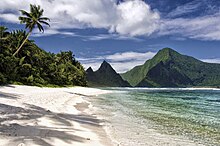Olosega and Ofu are twin islands in American Samoa. They are the westernmost of the Manu'a Islands. Ofu and Olosega are very much off the beaten track. The islands aren't set up for tourism but are a natural paradise, with gorgeous green cliffs, beaches and bright blue lagoons.
Understand
[edit]
Together, Ofu and Olosega have a population of about 500 people, of which 175 lived on Ofu in 2010. The islands are volcanic remnants separated by the narrow, 137-meter-wide (449-foot) Āsaga Strait, composed of shallow-water coral reef. Before 1970, people crossed between the two islands by waiting until low tide and then wading across the shallow water of the strait. Since 1970, there has been a bridge over the strait, providing a single-lane road that connects the two islands.
Ofu
[edit]Ofu is the western part of the volcanic outcrop of Ofu-Olosega Island. The main village of Ofu is located on the western shore, protected behind an offshore islet known as Nu'utele. Ofu has a small airport and a boat harbor that serve the population on Ofu and Olosega.
Most of the southern shore and associated coral reef are part of the National Park of American Samoa. Situated on the south coast of the island is To'aga lagoon which has a high diversity of corals and fishes. The marine site has been part of long term research and study on coral reefs and global climate change. The highest peak on Ofu Island is Mount Tumutumu (also called Tumu), at 491 m (1,611 ft).
The island is also home to the Samoa Flying-fox (Pteropus samoensis), a species of bat threatened by habitat loss.
Olosega
[edit]Olosega Island is a remnant of the Sili shield volcano, the caldera of which may lie submerged off the north shore. The highest peak on Olosega is Mount Piumafua, at 629 m (2,064 ft). The most recent volcanic eruption was in 1866, 3 km (1.9 mi) southeast of Olosega.
The Samoan name ʻOlosega means "fortress of parakeets".
There are four villages on Olosega: Olosega, Lalomoana, Sili and Faiava, but almost all the population of the island now reside in Olosega village along the southwestern-facing shore.
History
[edit]Pre-historic artifacts discovered on Ofu by archaeological field work in the 1980s significantly furthered understanding of the ancient history of Ofu in particular, and the Samoa Islands and Polynesia in general. The artifacts include ceramics, adzes, and worked shell and bone pieces. Samples of red-slipped plainware ceramics were found that appear to have been crafted in the tradition of the Lapita culture. The field work focused on a site called To'aga (site AS-13-1), a 2 km (1.2 mi) coastal stretch on the south coast of Ofu. Dating of the artifacts suggested that Ofu has been continuously inhabited by humans for about 3,000 years.
Get in
[edit]- 1 Ofu Airport (OFU IATA). The weekly flight from Pago Pago on Samoa Airways takes about half an hour.
Get around
[edit]A bridge crosses over the strait separating the islands. It provides a single lane road allowing people to get across.
See
[edit]

